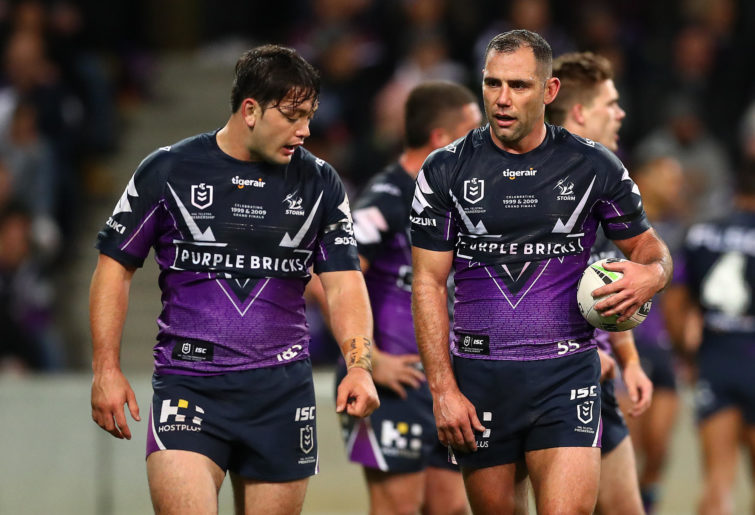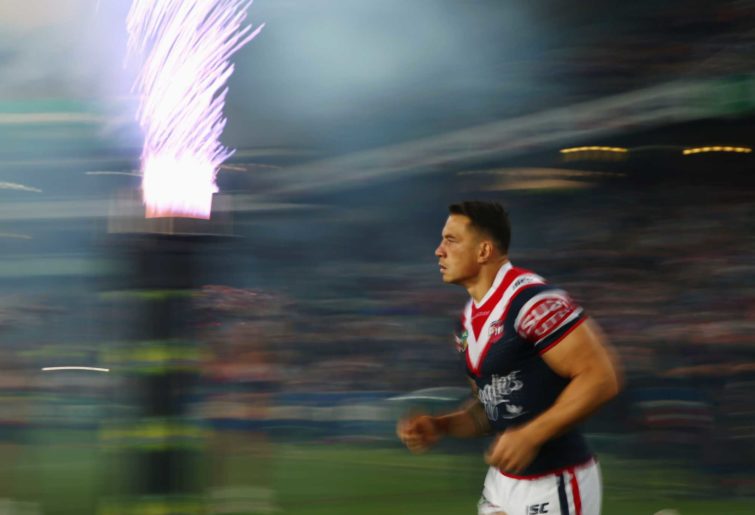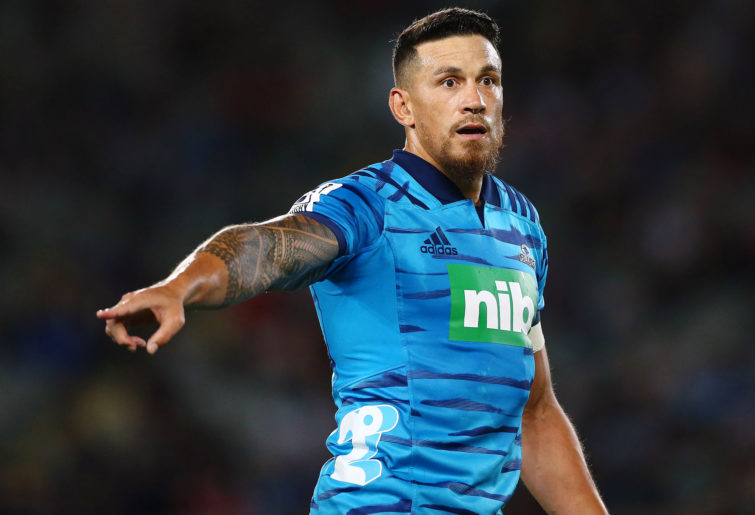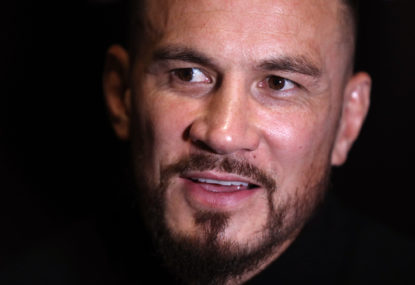Sonny Bill Williams has written a book, and I’m looking forward to reading it when it comes out on October 13. It promises to provide some perspective on why he felt he needed to leave the NRL all those years ago.
The book is called: “You Can’t Stop the Sun from Shining”. In it, Williams will provide some insights on the relationships between big business, professional sport and the young men who are its superstar products and athletes.
Young men who at times are struggling with life issues: young men who often lean into white substances, binge drinking and painkillers to mask their struggles and destroying themselves just trying to survive.
It is a timely book, 13 years in the making, and no doubt if the toxic culture existed back when Williams was the young superstar, it’s probably not been improving in those intervening years.
Very recently, as season 2021 is closing out, we got another insight: “Hey Dad, what’s the white substance?”
Do you mean the sideline? I’m here all week. But what Williams highlights is potentially as toxic as what is often cut into that white substance, is the culture of professional sports and our media and societal responses to what happened to him and what is still happening now.
Some commentary we have heard recently: “This is what used to be six beers.” Is it? Beer is legal and not linked to organised crime or terrorists.
There are no Mum and Pop shop growers and home brew for this product. It’s from Argentine Northwest, Bolivia, Colombia, Ecuador, and Peru. How it gets from those countries to a hotel coffee table on the Gold Coast isn’t an easy journey, and everyone else in the supply chain is risking prison or death.
There are a lot of documentaries and series on streaming services dedicated to the journey and so it’s not something we can claim to not really understand.
“Everyone is doing it these days.” Really? The cashed up elite maybe. The rest of us are broke, wouldn’t know where to get it, and are in lockdown. I am sure lots of current and former NRL players are on the powders: we know of an Immortal, current and former commentators, humours larrikins filmed in Ubers, and potentially those recently sneaking off to the toilet for a “kiss” – and probably lots of people under 35 on over $150k.
They want to fit in, party and make connections. I’m sure they are targets for temptations and on a big night out start to think they are Tony Montana.
But most of us regular people would end up getting kicked out of the BBQ if we started racking up on a coffee table at an end of year gathering with our mates. Because our friends would be very worried about us, and what brought us to the place where we think it’s okay.
It’s not just the legality of it: if this behaviour seems harmless, normal and not that big a deal to you, you are probably just an entitled person, who doesn’t understand they are taking enormous risks and that you’re mostly detached from large chunks of society.
The culture of professional sports not helping or doing enough was reflected in recent events. It was quickly reported that “RLPA Agreement does not permit drug testing this time of year.” This is the equivalent of the police not cracking down on road users during holiday periods, just an acknowledgement that drinking and speeding are likely to be happening, so they will look away during this time window.
It sounds great doesn’t it? The next time you arrive at a music festival: no cops, no dogs, no testing, just a window of space and time where you can cut loose with no consequences.
Sounds ideal, and if any videos come out, you’re supported by a workplace where if you are caught, you get a couple of extra days off and they dock your pay an unnoticeable amount, and then you can get back into it.
But that’s not going to happen to any of us and is not how this behaviour is managed for literally everyone else in society who isn’t super rich and just maybe being white helps a lot too.
Cameron Smith calling you “dumb” should not be the worst punishment. I’m not saying people don’t deserve forgiveness and second chances, but the disparity between them and the rest of us is huge.
The kids who grow up now thinking this is okay, or somehow cool, won’t have the protection of the Melbourne Storm or NRL. They won’t be able to just not talk about what the white substance, pretend it’s just an unknown white substance.

Cameron Smith and Brandon Smith. (Photo by Kelly Defina/Getty Images)
They won’t be able to not co-operate with police and inform on their supply chain without consequences – and can’t rely on their superstardom and larrikin image to get a she’ll be right from society.
Other commentary: “They are superstars of the game, if they weren’t this is a career-ending move.”
Think of a player on the fringes of first grade who was a drug user or low level dealer and their career ended. I don’t need to name them, but they are there. Away from the football field and among your life circles there will be a few, you’ll know of some. Guys you went to school with who fell at the early hurdles and never got back.
It’s a risky behaviour to encourage and what unfolds is likely to be young men sad and disappointed they got caught, promising to never doing it again and lots of media articles about how now they said sorry we can put it behind us and get back to rubbishing the Tigers and Eels or journalists bravely speaking out about how Latrell Mitchell is the biggest evil in rugby league.
The people in the videos are young men who are so disconnected from themselves and who they were as children, they seek out a white substance to feel up, to relax, to let go, to go off. Then the phone goes on, and old players start blaming the existence of phones, or blaming those who record videos as the real criminals.
Not the criminal behaviour of players or the dealers, or the enablers – the big problem is phones. I hope all the people in those videos find happiness and peace.
These latest cases are probably similar to Sonny Bill’s story. They started playing footy because they liked it, and were very good at it. The promise of success meant they could buy their Mum and Dad a house, help their friends and families. Somewhere between chopping up on a table, dancing on another table, falling asleep under another one – all of their reasons got lost.

Sonny Bill Williams of the Roosters runs out during the NRL 1st Qualifying Final match between the Sydney Roosters and the Penrith Panthers at Allianz Stadium on September 13, 2014 in Sydney, Australia. (Photo by Mark Kolbe/Getty Images)
The real crime according to the NRL and media is: bringing the game into disrepute. “Now you’ve done it, you’ve brought the game into disrepute.” Oh no!
Regular people get thrown on the ground by the police. Regular people get arrested, they go to court, they get criminal records, lose their jobs, lose their friends. Sometimes they go to jail. Disrepute is the lowest consequence, not the most extreme.
“Hey Dad, what is disrepute?” Good question.
Bringing the game into disrepute is the big consequence being thrown around, but there is more to it than that. How we now explain that behaviour to our children and the way we react to it will now teach a million lessons to a million people and all of that is outside of the control of those in the video.
The players will be fined and trotted out to cry and we will discuss who apologised well and who needed to self-flagellate some more. But it’s not about what they are fined, it’s what they personally commit to give from themselves on top of the fines some will say. This version of justice and consequence is reserved only for the rich and privileged.
The fines and missing games is the least punishment ever given to anyone ever for this behaviour, they are very lucky. For the rest of us, we are now explaining what a white substance is and why it’s either okay for these guys to do it, but not for any of us because we aren’t special.
We might try fumbling through why it’s not okay to do it but it’s still okay to look up to them as hero, or maybe they should pick another hero. Moving our kids onto to another player and crossing our fingers he isn’t also a party animal and extreme risk taker for the good gear.
Maybe kids just shouldn’t look up to NRL players, but it’s hard to think through all of this as a kid – you watch footy and they become your heroes. Maybe we start to wish the kids had just got into comic books. Superman never racks up lines with his sunnies on to be cool.

Sonny Bill Williams (Anthony Au-Yeung/Getty Images)
Violent behaviour is not cool and the NRL shouldn’t tolerate it, or long for the days when it was okay. Illegal behaviour is not cool and the NRL should not use the fact that it’s players are skilled and privileged to let it slide.
This is not “boys will be boys”. It is “boys will be men one day” and we need to look after them. They have lost themselves, and we lost a bit more of ourselves. For Sonny, he found Islam, left league entirely for a while, found himself, found purpose, a voice and found some peace.
I’m not sure what future books those caught up in the controversy will write. I’m not sure what books the non-superstar players on the “nose beers” and “party train” whose names we don’t know, and who we will struggle to remember at a trivia night will write.
I don’t know how to fix it, but thankfully for all of us, I am not in charge of the NRL. I don’t run any professional sporting clubs, or any unprofessional ones for that matter. I am also not a media journalist presenting well trodden narratives about fixing a few bad eggs, fixing one bad club, fixing Mad Monday, or the bad friends with phones.
But I’ll be buying Sonny Bill’s book and reading it. I hope these young men do as well. They might relate to his story and it might help them think about what their own future chapters will look like. And I hope collectively, we can work on what story we are telling to our children.
































































































